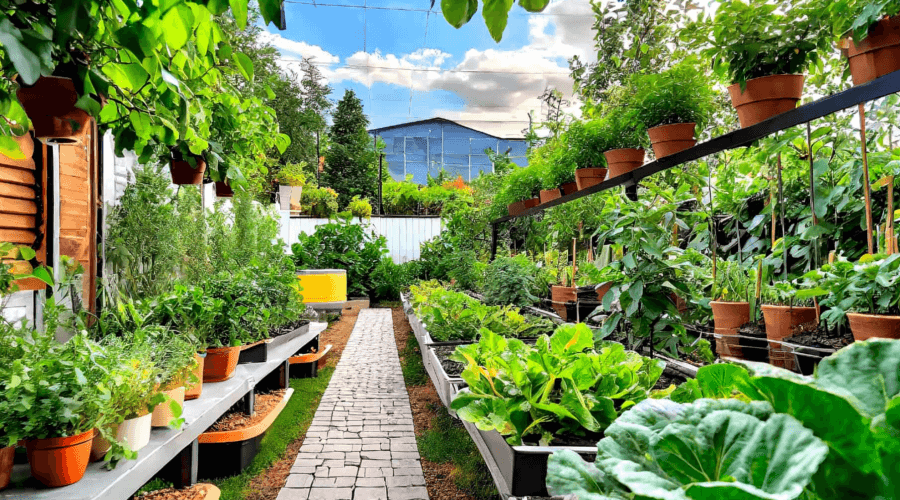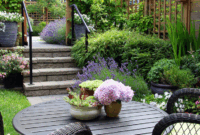Imagine a garden that waters itself, trims the lawn, monitors plant health, and even sends alerts to your phone when something needs attention. In 2025, fully automated gardens are no longer a futuristic dream but a reality. With advancements in artificial intelligence (AI), the Internet of Things (IoT), and sustainable technology, homeowners can now create a smart garden that minimizes effort while maximizing efficiency.
1. Smart Irrigation Systems: Watering on Autopilot
Traditional watering methods often lead to overwatering or underwatering, but modern smart irrigation systems solve this problem effortlessly. Devices like the Rachio 3 and Orbit B-Hyve use AI to analyze weather patterns, soil moisture, and plant needs to optimize watering schedules. These systems can be controlled via smartphone apps, ensuring precise water usage, which saves money and conserves resources.
2. AI-Powered Plant Monitoring
AI-driven sensors and cameras now allow you to monitor your plants in real-time. Products like the Xiaomi MiFlora and Parrot Flower Power analyze soil moisture, temperature, sunlight, and humidity, providing instant feedback. Some advanced systems even offer automatic nutrient dosing, ensuring that your plants receive the right balance of nutrients at the right time.
3. Robotic Lawn Mowers: Hands-Free Lawn Care
Keeping your lawn well-maintained is a time-consuming task, but robotic lawn mowers like the Husqvarna Automower and Worx Landroid take care of it effortlessly. These machines navigate your yard, cutting grass at optimal lengths while avoiding obstacles. Many models are equipped with AI learning capabilities, improving efficiency over time.
4. IoT-Enabled Greenhouses
For gardening enthusiasts who want full control over their plants, IoT-enabled greenhouses offer a high-tech solution. Automated greenhouses regulate temperature, humidity, and ventilation using smart sensors. Systems like the Click & Grow Smart Garden and AeroGarden are perfect for small spaces, while commercial-grade solutions provide large-scale automation for home gardeners.
5. Hydroponic and Vertical Farming Automation
Hydroponics and vertical farming are gaining popularity due to their efficiency and sustainability. Automated hydroponic systems, such as the Lettuce Grow Farmstand and Rise Gardens, use AI and sensors to monitor nutrient levels and water circulation. These smart setups ensure consistent growth while reducing water waste.
6. Smart Pest Control Solutions
Pests can destroy a garden in no time, but smart pest control solutions like ultrasonic repellents and AI-driven monitoring cameras can keep them at bay. Systems like Bird-X and Motion-Activated Sprinklers detect and deter animals without the need for harmful chemicals. Some systems even integrate with smart home platforms like Alexa and Google Assistant for seamless control.
7. Solar-Powered Garden Automation
Sustainability is a key trend in 2025, and solar-powered garden technology is leading the way. Devices like solar irrigation pumps, solar garden lights, and autonomous weeding robots ensure that your garden remains eco-friendly while cutting down on energy costs. Products like Tertill, the solar-powered weeding robot, automatically remove weeds without harming your plants.
8. Automated Composting Systems
Composting is a great way to recycle kitchen and garden waste, but manual composting can be tedious. Automated composting systems like Lomi and Reencle turn organic waste into nutrient-rich soil with minimal effort. These smart composters monitor humidity and temperature to accelerate decomposition while eliminating odors.
9. Voice-Controlled Garden Management
Smart assistants like Alexa and Google Home now integrate with garden automation tools, allowing you to control irrigation, lighting, and lawn care with simple voice commands. Whether you want to turn on your irrigation system or check the health of your plants, voice-activated gardening makes maintenance more convenient than ever.
10. Future Trends in Automated Gardening
The future of gardening automation will continue to evolve with AI, machine learning, and robotics. Some exciting developments include drone-based pollination, AI-powered garden design software, and self-sustaining permaculture gardens that require minimal human intervention.
Final Thoughts
Automating your garden in 2025 is not just about convenience—it’s about efficiency, sustainability, and precision. With the latest advancements in smart technology, you can create a fully automated garden that thrives with minimal effort. Whether you’re a beginner or an experienced gardener, investing in automation will transform the way you maintain your outdoor space.
Would you like recommendations for the best smart gardening gadgets to get started? Let us know in the comments!




